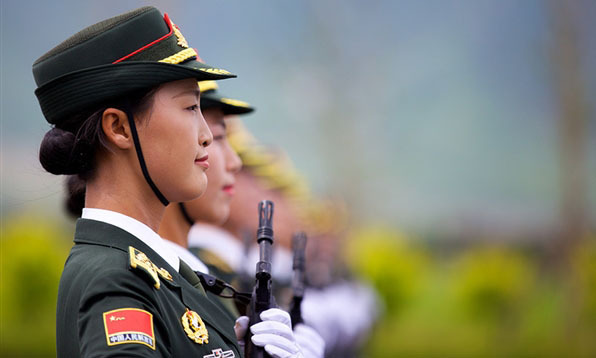History made us what we are - nothing must be forgotten
- By Tim Collard
 0 Comment(s)
0 Comment(s) Print
Print E-mail China.org.cn, September 3, 2015
E-mail China.org.cn, September 3, 2015
|
|
|
The past few decades have changes in the uniforms used in the parades through Tian'anmen Square. |
This year, we commemorate the 70th anniversary of the end of one of the darkest periods in human history, the Second World War. Everyone knows some of the details of the conflict; and we are aware that the immediate cause of the Japanese surrender was the dropping of atomic bombs on Hiroshima and Nagasaki.
We can only hope that nuclear weapons will never again be used in war, but it is generally agreed that their use was necessary on this occasion, to ensure a quick end to the horrors of Japanese tyranny in East Asia. Without them, the struggle, and the martyrdom of Chinese and other Asian peoples, might have continued for another year at least.
In Western Europe we usually think of the war as having begun in 1939; in America and Russia, the date is 1941. However, the real war began much earlier, with the Japanese invasion of China dating from the initial attack on Shenyang in 1931. Many nations fought and suffered in the war, but none for longer time than China.
Japan tried to avoid war by befriending the Western powers; but Europe and the U.S. made it clear that any alliance would require the renunciation of Japanese conquests in China. The Japanese were not prepared to do this, and so could only line up with the other Axis aggressor states, Germany and Italy.
The Japanese invasion had a devastating effect on China, but there was one positive: China, which had been in a state of internal chaos for two decades, was able to unite again in resistance. The symbol of this was the Xi'an Incident in 1936, in which Marshals Zhang Xueliang and Yang Hucheng arrested KMT leader Chiang Kai-shek and compelled him to make common cause with the Communists against the invaders.
The experience of Japanese occupation was so appalling that internal dissensions needed to be laid aside in order to fight this brutal common enemy. China still suffered in the short term, but was strengthened and unified by that suffering.
After their initial triumphs, however, it became clear that the Germans and Japanese had overreached themselves, especially when they brought the United States into the war. From then onwards the aggressors were fighting on too many fronts. And, just as the steadfast Soviet resistance wore the Germans down and gradually turned the tide of the war in Europe, so the Chinese resistance kept millions of Japanese soldiers occupied while the tide turned in Asia.







Go to Forum >>0 Comment(s)